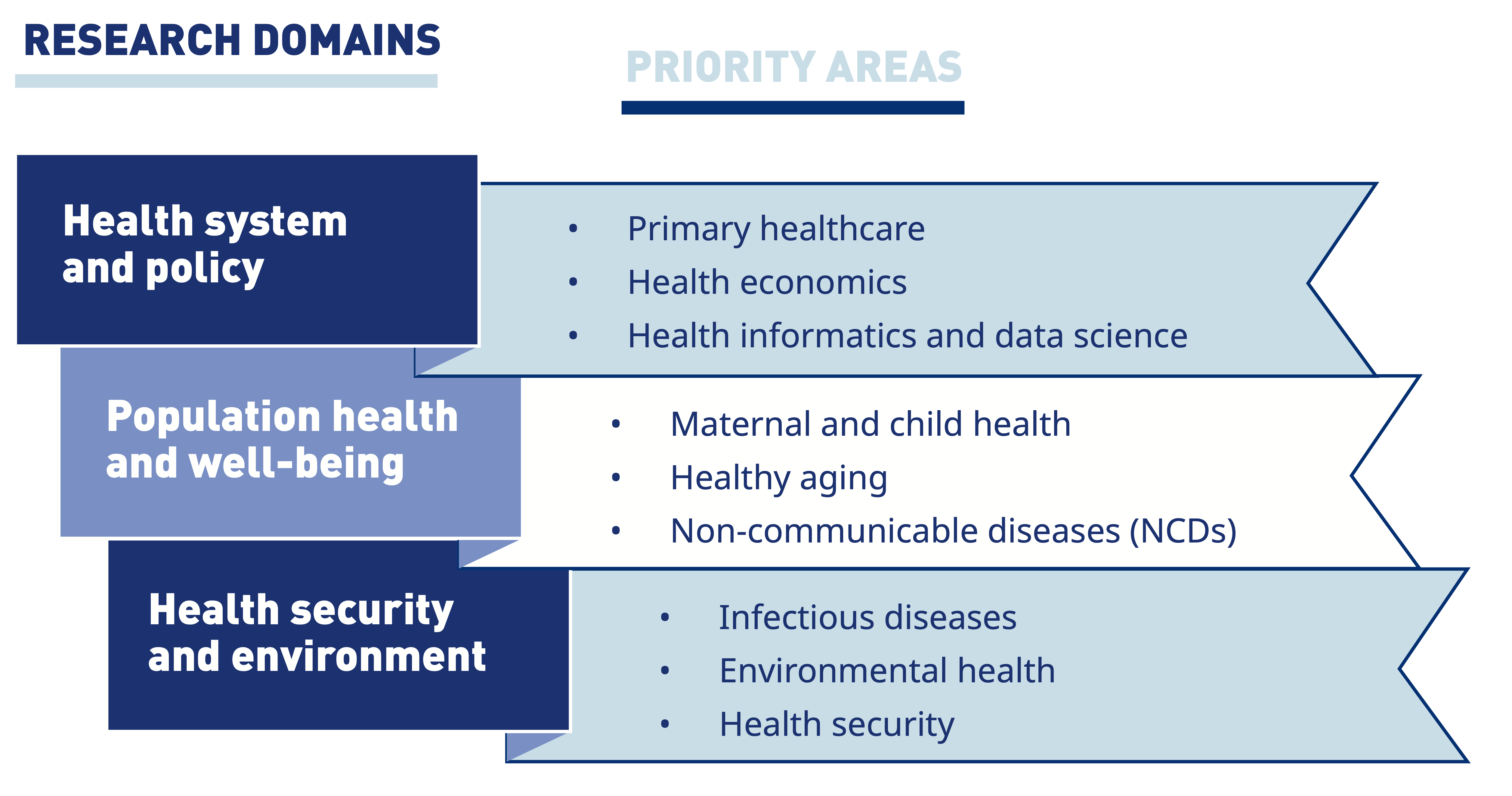
The Global Health Research Center was built upon principles of academic excellence and policy relevance. Taking interdisciplinary approaches, we have collaborated with global and domestic partners on projects covering three domains: health system and policy, population health and well-being, and health security and environment. The scientific products we produce provide critical support for informed policymaking and empower a greater community to reimagine global health solutions and create a lasting impact on health equity.

The Innovation Lab for Vaccine Delivery Research (VaxLab)
The Innovation Lab for Vaccine Delivery Research (VaxLab) was launched in 2021 to improve equitable and affordable access to life-saving vaccines through research and evidence-based advocacy. Funded by Gates Foundation and led by Prof. Shenglan Tang, the project has established its brand as a leading research and advocacy platform to advance the National Immunization Program (NIP) in China and throughout the region. By the end of 2024, the VaxLab had completed 6 research projects and 11 are ongoing. Research has led to 30 publications in leading peer-reviewed journals. Research deliverables have formed the basis for evidence-based policy advocacy to drive the improvement and expansion of NIP.
VaxLab’s Thematic Series on BMC Infectious Diseases of Poverty:
https://www.biomedcentral.com/collections/cnnip
VaxLab & CIKD’s International Symposium:
Sustainable financing of the EPI and HPV/PCV introduction in Vietnam
Led by Prof. Shenglan Tang and Prof. Xinyu Zhang, in collaboration with the Vietnam Health Strategy and Policy Institute (HSPI) and the Duke Global Health Institute (DGHI), this project aims to assess the current state and challenges of health financing for immunization in Vietnam. It also includes additional studies on cost-effectiveness analysis (CEA) and budget impact analysis (BIA) for the introduction of HPV and PCV vaccines into the Expanded Program on Immunization (EPI).
Effective coverage of maternal and child health care: Public and private mix service provision in Cambodia
Collaborating with the University of Health Sciences in Phnom Penh, the project, led by Prof. Qian Long, investigates the effective coverage of maternal and child health care between public and private health facilities over the past two decades in Cambodia. It also explores social factors, health system determinants, and contextual issues that influence access to quality maternal and child health care.
Strengthening Primary Health Care System in China: Achievements and Challenges
Led by Prof. Qian Long, the project commenced in January 2024 in partnership with the National Health Commission. The study aims to gain a deeper understanding of the development of the primary healthcare system since 2009, as well as changes in the utilization of primary healthcare in China, with a focus on the disparities between urban and rural areas and across regions with varying levels of socio-economic development.
Social Health Protection Schemes and Non-Communicable Diseases Prevention and Treatment in Cambodia
Led by Prof. Marius Wamsiedel, this project examines the role of social health protection schemes in addressing non-communicable diseases such as hypertension and diabetes in Cambodia.
Impact Evaluation of China’s National Integrated Demonstration Areas for NCD Prevention and Control
In response to rising NCD rates, China launched the National Integrated Demonstration Areas for the Prevention and Control of Noncommunicable Diseases program in 2011. In collaboration with the National Center for Chronic and Noncommunicable Disease Control and Prevention (NCNCD) of China CDC, GHRC conducted the first national assessment of the program’s causal effects on behavioral risk factors. Led by Prof. Lijing Yan (GHRC) and Dr. Jing Wu (China CDC), the research team applied the synthetic difference-in-differences method to data from 26 demonstration areas and 100 non-demonstration areas.
The Role of Family Ties in Pandemic Response: Evidence from 93 Countries
Prof. Ming Gu led a study examining how family ties influence pandemic control. Analyzing data from 61,478 individuals across 93 countries, the research demonstrated that stronger family connections were associated with higher adherence to preventive measures—including handwashing, social distancing, and vaccination—during the COVID-19 pandemic.
Intergenerational Trauma in a Longitudinal Birth Cohort Study
The Barbados Nutrition Study (BNS) is an ongoing 50-year longitudinal birth cohort study in the Caribbean Island country of Barbados. Prof. Rebecca Hock and BNS collaborators have been investigating the long-term effects of early life adversities, including malnutrition and maltreatment, throughout the life course and into the next generation. In 2024, the team found that childhood sexual abuse in Generation 1 was associated with a 5.7 times higher likelihood of abuse or neglect in their offspring, highlighting the persistence of intergenerational trauma.
Exploring Primary Healthcare Utilization Among Vulnerable Populations in China
Prof. Marius Wamsiedel conducted a study examining health needs and primary healthcare utilization among three vulnerable groups in China: the rural population, rural-to-urban migrants, and the elderly, particularly those aged 80 and above. The project is a collaborative effort with Wuhan University, jointly funded by the Kunshan Municipality and Wuhan University.
Exploring the Burden of Feline Upper Respiratory Tract Pathogens in China
Feline respiratory disease complex (FRDC) encompasses illnesses caused by various viruses and bacteria, yet data on FRDC pathogens in China remain limited. Prof. Sajid Umar’s study investigated the prevalence of FRDC pathogens collected from local veterinary clinics in Kunshan (2021–2024). The research provided valuable evidence for the disease burden of respiratory infections in cats in Kunshan, highlighting the need for ongoing One Health surveillance and monitoring of emerging pathogens.
The Global Health Research Center (GHRC) leverages its global expertise and network to address local health challenges through dynamic approaches. GHRC researchers work closely with healthcare providers, policymakers, and community leaders to co-design context-sensitive solutions that improve local population health. These efforts strengthen both knowledge exchange and local healthcare providers’ capacity.
Selected Project Lists (by 2024):

© 2025 Duke Kunshan University 苏ICP备16021093号